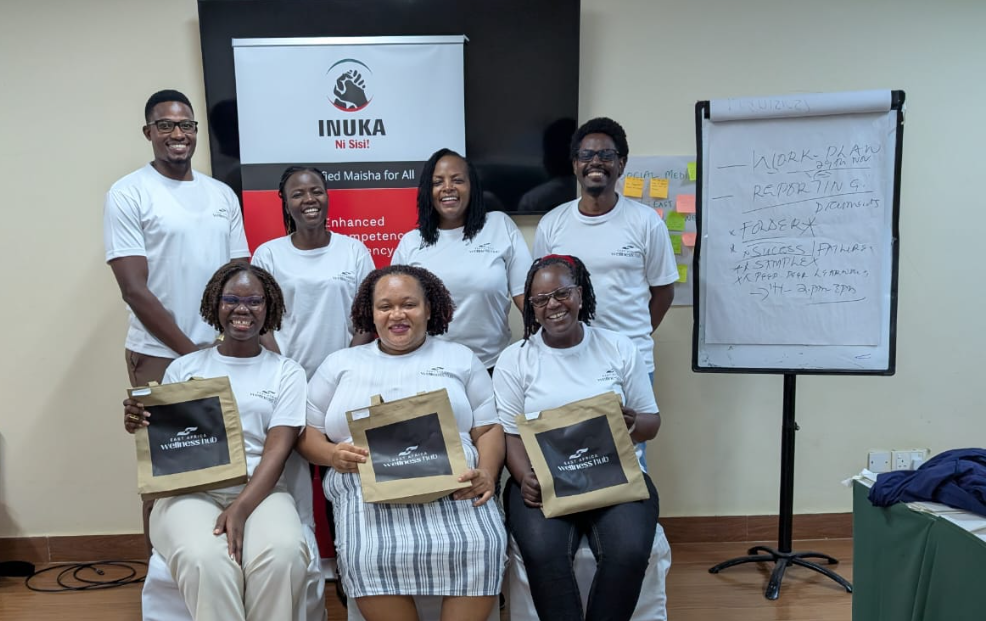
UNNGOF Joins Inuka Ni Sisi for Mental Health Curriculum Training in Machakos County, Kenya
UNNGOF was delighted to have our team participate in the Inuka Ni Sisi curriculum training on mental health, held from the 18th to the 22nd of November, 2024, in Machakos County, Kenya. This training brought together participants from partner organizations in Kenya, Uganda, and Tanzania with the goal of equipping them with the knowledge and skills to provide psychological first aid, design mental health wellness programs within their workplaces, and train others to build a community of practice on mental health across the region.
Day 1: Understanding Mental Health Concepts and Stereotypes
The first day of the training provided a comprehensive foundation for participants to explore key mental health concepts, challenge existing stereotypes, and gain a deeper understanding of common mental health issues. The session focused on defining concepts based on the World Health Organization’s criteria, covering topics such as anxiety, stress, depression, post-traumatic stress disorder, communication in wellness, and common stereotypes surrounding mental health. Participants were encouraged to re-evaluate preconceived notions and develop a more informed and empathetic approach toward mental health. This set the tone for the rest of the training, laying the groundwork for practical applications in their work and personal lives.
Day 2: Peer Support, Self-Help, and Goal Setting
On Day 2, the curriculum shifted toward practical applications of mental health support, starting with a check-in exercise where each participant shared their emotional status using an emotional thermometer. This exercise underscored the importance of emotional awareness and self-check-ins as part of maintaining mental well-being.
The day’s discussions focused on peer support and self-help, emphasizing the power of community in mental health care. Participants learned the value of peer support groups, where individuals with shared experiences can offer non-judgmental, compassionate listening and encouragement. Such groups play a crucial role in fostering emotional resilience and promoting proactive mental health practices.
Participants also discussed how workplaces can support mental health by setting wellness goals for staff. These goals should be realistic, achievable, and centered on self-care, personal development, and emotional well-being. Encouraging staff to prioritize mental health and seek professional help when necessary became a key takeaway from the day.
The training also addressed common treatment approaches for mental health issues, including therapy, medication, support groups, and lifestyle changes. While therapy and lifestyle changes were emphasized as the first line of defense, medication was presented as a last resort, highlighting the importance of a holistic approach to mental health.
Day 3: Healing from Trauma
On the third day, participants took part in a trauma healing session, which encouraged them to reconnect with their feelings and emotions, and to reconcile childhood experiences with their current life situations. The session highlighted the importance of understanding and healing personal childhood traumas in order to better support others in their emotional and mental well-being journeys.
“When we recognize and address our own traumas, we cultivate greater empathy and offer more effective support to those facing similar challenges.”
Key Takeaways from the Training
Several insights emerged from the curriculum training:
- Many organizations lack distinct wellness programs for their employees, which can make it challenging to offer consistent support for mental health issues when they arise.
- It was emphasized that policies should incorporate a wellness lens, with flexibility to adapt to unforeseen changes. Rigid policy frameworks can sometimes inadvertently contribute to mental health challenges in the workplace.
- Issues arising from family, childhood, or external sources can significantly affect an employee’s mental health and workplace performance. Having wellness programs in place can help employees manage these challenges.
- For organizations to effectively support others, they must first address their own internal traumas and cultivate a wellness-oriented culture. Policies and practices should be aligned to support mental health.
- The concept of a ‘situation room’ was clarified during the training. This space, intended for peer-to-peer support or therapist-client sessions, should not be limited to professional therapy only. It can also serve as a safe space for informal, supportive conversations among colleagues.
Conclusion
Participants were inspired to take these insights back to their countries and organizations, building a community of practice that will continue to prioritize mental health and wellness across East Africa. The lessons learned will undoubtedly play a crucial role in shaping healthier, more resilient communities.



